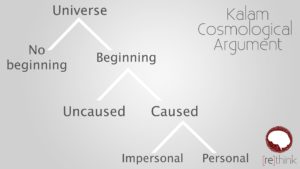Is There a God? {Part 2}
Why is there something rather than nothing?
In 2012, theoretical physicist, cosmologist, and professor Lawrence Krauss wrote a book called A Universe from Nothing in attempt to answer this monumental question. In an interview with Steve Paikin about his new work, Krauss said that we need to rethink “nothing.” “We find out that empty space is actually a boiling, bubbling brew of virtual particles popping in and out of existence every second so quickly you can’t see them. In fact, if you try to measure them, they’re not there.”
Confusing as it may seem, the point of Krauss’ quote is the difficulty with which scientists or others have attempted to answer the question why is there something rather than nothing? It’s a tough one. Some would argue that something—the universe—is evidence for a God who chose to create it, while others, like Krauss, would disagree; many believe that God is used as a cop-out for science we don’t fully understand yet.
Atheists have even gone as far as to say that nonexistence is really “virtual particles popping in and out of existence.” But let’s think about that logically. [Note: the point is not to argue with the science of renowned scientists. They are scholars. But we must think logically about the conclusions they draw from their fields and the implications of those conclusions.] If the definition of empty space is the complete lack of something, then there cannot be any brewing, bubbling particles; it is either empty space—nothing—or particle-filled space—something.
We cannot redefine the word nothing to mean a-little-bit-something. In the realm of logic, that is called the fallacy (invalid argument) of equivocation: changing the definition of a word to extrapolate the desired conclusion. And for Krauss, that leaves the question unanswered, why are there particles rather than no particles?
Why do atheists struggle to explain the universe without a cause, a God? For starters, the Second Law of Thermodynamics shows that everything tends from order to disorder. We witness this scientific law in all areas of life, like a decaying tree, an organized room getting messier and messier, or a body aging. In essence, the universe is a clock unwinding. But that suggests that someone wound it up in the first place. Thus, the Second Law of Thermodynamics makes it difficult to deny an original source of life or creator.
Another reason it is difficult—arguably impossible—to explain this something-from-nothing-universe without God is the Law of Cause and Effect, which states that every effect has a cause. In fact, this law supports one of the strongest argument’s for God’s existence, called the Kalam Cosmological argument. It states:
If something began to exist, it must have a cause.
The universe began to exist.
Therefore, the universe had a cause.
Or, in logical form:
Existence⊃ Cause
Existence
∴ Cause
The only logical answer to why is there something rather than nothing? is a free, creating agent who first willed that it exist. We call an agent with the ability to choose to act or not to act a personal being; this means that God exists as a personal creator. Personal beings choose to do something rather than nothing. On the other hand, impersonal beings, like rocks, don’t make choices, like decide to eat pizza for lunch instead of tacos. God is personal, and the universe is his choice.
Thus, the fact that there is something rather than nothing—the fact that there is a universe, a Milky Way, a planet called Earth, populated by billions of people and animals, and covered with plants and seas and mountains—points to a personal being, namely, a Creating God. He chose this universe, this planet, and these people to exist rather than not to exist.
But that leads to the question, what caused God? First of all, we must understand that if God created the universe, he is eternal. He is not an effect, which means he is outside the law of causality, not in violation of it. Remember, God is not a caused cause, or else he would be one part of an infinite series of causes and effects—“turtles all the way down.” But infinity is not a sufficient explanation. There must be a cause which is not an effect, but is existence itself. God is not a caused being. He is the cause of everything, seen and unseen.
Aristotle alluded to the admission of theism in his discovery that there must be an “unmoved mover” who set all things in motion. Aquinas furthered this argument in his deduction from contingency, which states that every existence is dependent upon the existence of something else; this means that somewhere, there is an independent, causal existence. We are the contingent beings, and he is the independent one.
If you have heard someone say that God is a necessary being, this is what they mean. He is the existence from which everything else exists. It’s either God or an infinite regress (which is shifting the question further and further away but never answering it). For those who are familiar with the Christian scriptures, this should come as no surprise. In Exodus 3:14, God introduces himself as “I Am Who I Am.” In other words, He calls himself existence and being, or First Mover. This name is completely consistent with what we deduce about God from science and logic and the existence of the universe.
So, why is there something rather than nothing? God created it. God, the necessary choosing, creating existence, is. He is something rather than nothing, and from him are all things (Romans 11:36). The universe shouts his name, yet people often run from the truth of his existence, going as far as to redefine and manipulate definitions. Ironically, the very mouths that deny him are contingent upon his existence. Once, there was nothing, and now there is something – actually everything— because God is “I Am Who I Am.”
“The existence of a prime mover- nothing can move itself; there must be a first mover. The first mover is called God.” – St. Thomas Aquinas
Madelyn Wood





If there is no GOD why are we talking about him??
If there is no GOD why areYOU talking about him??